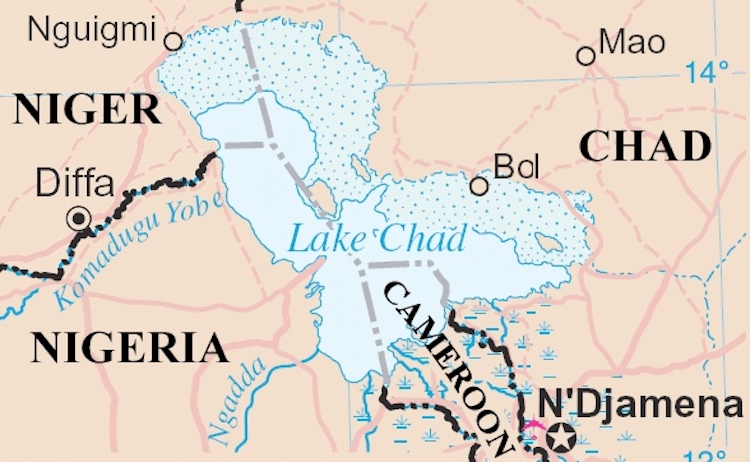By Ramesh Jaura
BERLIN (IDN) – Foreign Minister Heiko Maas of Europe’s powerhouse Germany, which joins the UN Security Council next January as a non-permanent member for 2019-2020, has pledged 100 million Euros (116 million USD) in emergency aid until 2020 to lessen the sufferings of over 10 million people in Africa’s crisis-ridden Lake Chad region. This is in addition to 40 million Euros already earmarked to aid political stability in 2018 and 2019.
Maas, who was opening a two-day high-ranking international donor conference in Berlin on September 3 said the Lake Chad region – once a crucial interface between the Sahara and the southern part of Africa – is “one of the greatest humanitarian disasters of our times”.
Responding to the grave situation, the donor nations pledged more than 2 billion USD to be made available “over coming years”, according to a German foreign ministry statement.
Mark Lowcock, Emergency Relief Coordinator and UN Under-Secretary-General for Humanitarian Affairs, told journalists on the side-lines of the conference that at the 2017 donor conference in Oslo, Norway had raised 672 million USD. Subsequently, a famine was prevented in the region. But millions of people in Nigeria, Niger, Chad and Cameroon were still in pressing need of help, he said.
“The crisis is not over. There are still 10 million people who need lifesaving assistance,” he said. “A quarter of the people we are trying to reach are displaced from their homes and the only means of staying alive they have is what is provided by humanitarian organisations.”
In an interview with the Deutsche Welle, United Nations Development Programme (UNDP) Administrator Achim Steiner said, the fate of the world body is that “it often presents the world with what it would need and what countries in the international community need to do to actually help people adequately”. But rarely are those pledges fulfilled. In contrast, 90 percent of the pledged funding in 2017 was received, “which is very positive news,” he added.
The Berlin conference has been jointly organised by the governments of Germany, Nigeria and Norway and the United Nations. More than 70 delegations from governments, regional and international organisations and civil society representatives engaged in the Lake Chad region, where the borders of Nigeria, Niger, Chad and Cameroon converge, were participating.
Prominent participants included: Khadija Bukar Abba-Ibrahim, Minister of State for Foreign Affairs, Nigeria; Achim Steiner, UNDP Administrator; Mark Lowcock, Emergency Relief Coordinator and Under-Secretary-General for Humanitarian Affairs; Laouan Magagi, Minister of Humanitarian Action and Disaster Management, Niger; Hissein Tahir Souguimi, State Secretary, Ministry of Economy and Development Planning, Chad; Félix Mbayu, Minister Delegate, Ministry of External Relations, Cameroon; and Ine Eriksen Søreide, Minister of Foreign Affairs, Norway.
The Lake Chad region is facing many major challenges, including famine, violence, drought and displacement. The terrorist activities of Boko Haram, a jihadist militant organization based in north-eastern Nigeria, are adding to the travails of the people.
The conference aimed to galvanize efforts towards strengthening humanitarian assistance, building the resilience of people still affected by the crisis. Yet another goal was fostering sustainable development and generating political and financial support to enhance cross-border cooperation and tackle the crisis in the Lake Chad region.
The conference also aimed at stabilization, understood as shaping political processes in order to contain violence. Stabilization initiatives seek to enable first steps towards reconciliation between parties to the conflict and to establish social and political consensus as a foundation for legitimate political structures and long-term development, according to conference sources.
The expected political process aims at contributing to the ongoing efforts of the Lake Chad Basin Commission and the African Union to develop a full-fledged stabilization strategy for the region. On August 31, Nigeria, Niger, Chad and Cameroon adopted the stabilisation strategy under the aegis of the African Union and the Lake Chad Basin Commission.
The significance of the Berlin conference is also underscored by the fact that for eight years, the Islamist Boko Haram group has been terrorising the population: over 30,000 people have been killed and more than 2.3 million men, women and children displaced.
Even though the four (Nigeria, Niger, Chad and Cameroon) countries’ armed forces, working together, have largely succeeded in driving the terrorists back, an important partial victory, kidnappings and suicide attacks continue to threaten people’s lives on a daily basis. The humanitarian situation remains critical – more than ten million people are dependent on humanitarian assistance.
Yet this is not all, states a conference background paper. Beside Boko Haram, other terrorist groups, such as the so-called Islamic State, and organised crime are destabilising the region, and also making it a trouble spot for Europe – because of refugees from the region seeking migration particularly to countries such as Germany.
Not the least with this in view, Germany is contributing its share to help the people in the Lake Chad region – over the last two years alone it has earmarked more than 150 million euros (approximately USD 174 million) for humanitarian assistance.
The country is also promoting cross-border cooperation in the region. This includes a meeting of the governors from all four countries in Nigeria in May to promote cooperation at all government levels. In September 2017, government representatives from the Lake Chad region gathered in Berlin to meet international partners. [IDN-InDepthNews – 03 September 2018]
Photo: Lake Chad map. Source: Wikimedia Commons.
IDN is flagship agency of the International Press Syndicate.
facebook.com/IDN.GoingDeeper – twitter.com/InDepthNews

